Table of Contents
ToggleWhat is a Criminal Background Check for Employment?
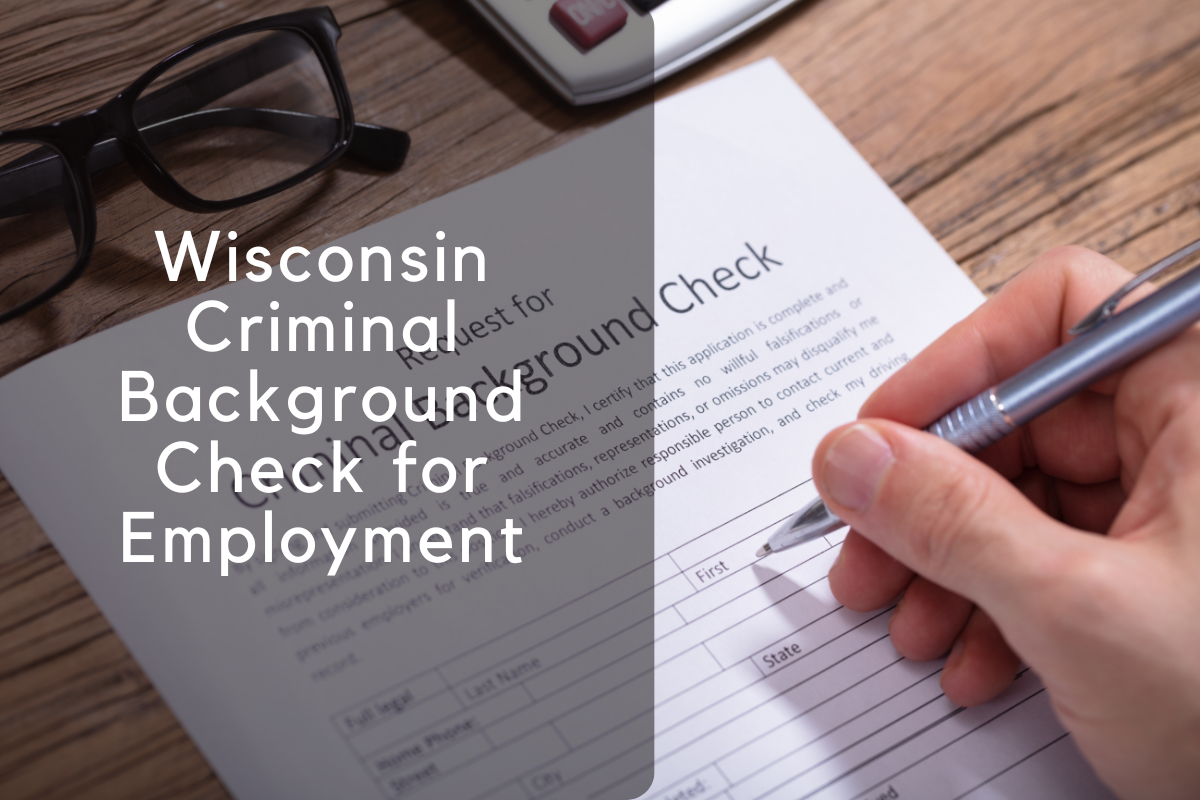
A criminal background check for employment is a process where an employer reviews an individual’s criminal history as part of their hiring process. The primary purpose is to assess an applicant’s criminal record to determine whether they are suitable for a specific role. In Wisconsin, this check is often conducted for positions that involve high levels of responsibility, access to sensitive information, or public safety concerns.
Employers use criminal background checks to ensure they are hiring individuals who meet the required standards for the job and to protect their company, employees, and clients from potential risks. It also helps employers comply with laws that mandate background checks for certain positions, such as those in healthcare, education, and financial services.
Why Do Employers in Wisconsin Require Criminal Background Checks?
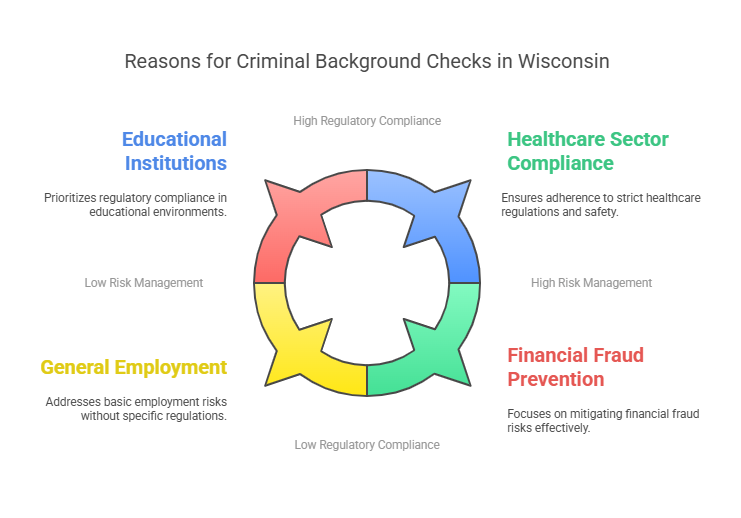
Employers in Wisconsin require criminal background checks for several reasons, including:
- Workplace Safety: Employers want to ensure that individuals who are hired do not pose a risk to other employees, customers, or the overall work environment.
- Trust and Integrity: In certain sectors, such as finance, healthcare, and childcare, employers must be certain that employees can be trusted with confidential information or vulnerable populations.
- Compliance with Industry Regulations: Some industries have regulations that require criminal background checks for all employees or for certain positions (e.g., law enforcement, education, healthcare).
- Risk Mitigation: Hiring an individual with a criminal record can expose employers to legal risks, such as negligence claims or liability for unsafe workplace conditions.
- Fraud Prevention: Background checks help prevent potential fraud or dishonesty, particularly in positions where financial responsibility is involved.
Overview of Wisconsin’s Criminal Background Check Process
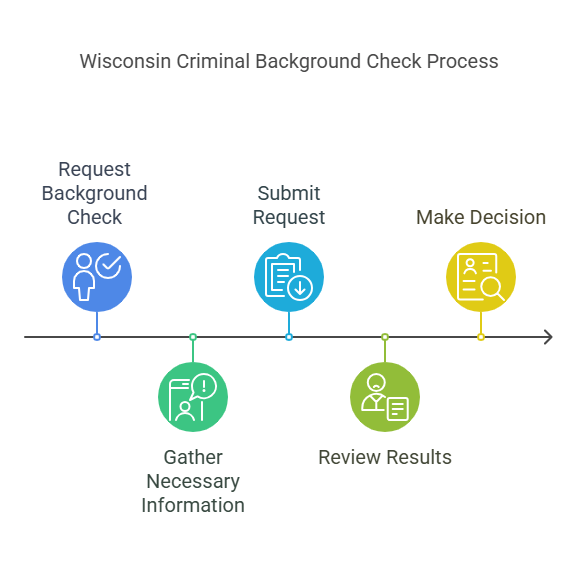
In Wisconsin, the criminal background check process involves several key steps that help employers verify an applicant’s criminal history:
- Requesting the Background Check: Employers may request a criminal background check through the Wisconsin Department of Justice (DOJ) or other authorized third-party vendors.
- Gathering Necessary Information: Employers will typically need the applicant’s full name, date of birth, Social Security number, and possibly fingerprints, depending on the nature of the position.
- Submitting the Request: Employers can submit their background check request online or by mail to the Wisconsin DOJ or through accredited background check services.
- Reviewing the Results: Once the background check is complete, the employer receives a report that lists any criminal offenses associated with the applicant’s name.
- Decision Making: Employers review the report to determine if any criminal history is relevant to the job position. It’s important that employers follow proper procedures in evaluating criminal records in relation to the position being applied for.
Types of Criminal Records Checked in Wisconsin Employment Screening
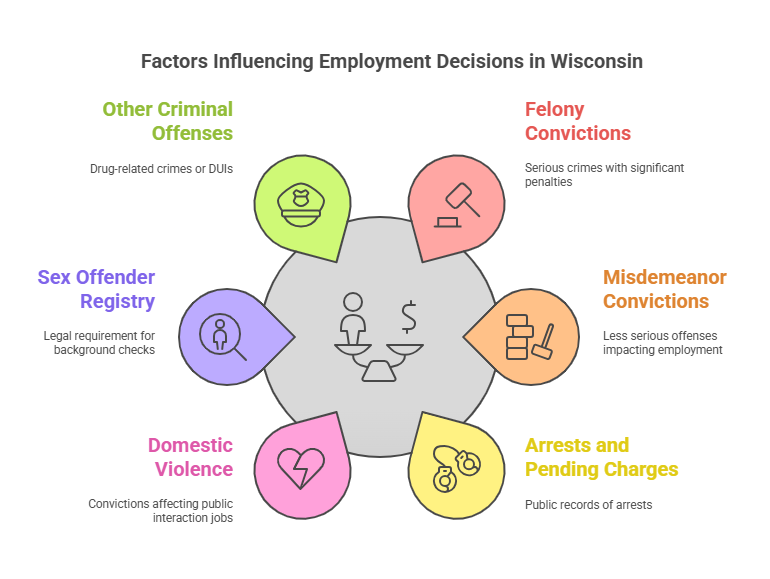
Wisconsin criminal background checks can reveal a range of criminal records, which may include:
- Felony Convictions: Felony offenses are serious crimes that usually result in longer sentences and significant penalties. These offenses can have a major impact on employment decisions, particularly for roles requiring trust and integrity.
- Misdemeanor Convictions: Misdemeanors are less serious offenses but can still influence employment, especially in fields that require security or working with vulnerable populations. Common examples include theft or assault charges.
- Arrests and Pending Charges: While arrests without conviction generally do not result in a criminal record, they may appear on a background check. In Wisconsin, arrests are part of the public record, and employers may see if an applicant has been arrested, even if no charges were filed.
- Domestic Violence: Wisconsin law requires employers to pay special attention to convictions related to domestic violence, as they can impact employment, especially in jobs requiring interaction with the public, children, or vulnerable individuals.
- Sex Offender Registry: Employers in Wisconsin are legally required to conduct background checks that include verifying whether an applicant is listed on the state’s sex offender registry.
- Other Criminal Offenses: Additional offenses, such as drug-related crimes or DUIs, may show up during background checks and could affect employment eligibility, depending on the job type.
How to Conduct a Criminal Background Check for Employment in Wisconsin
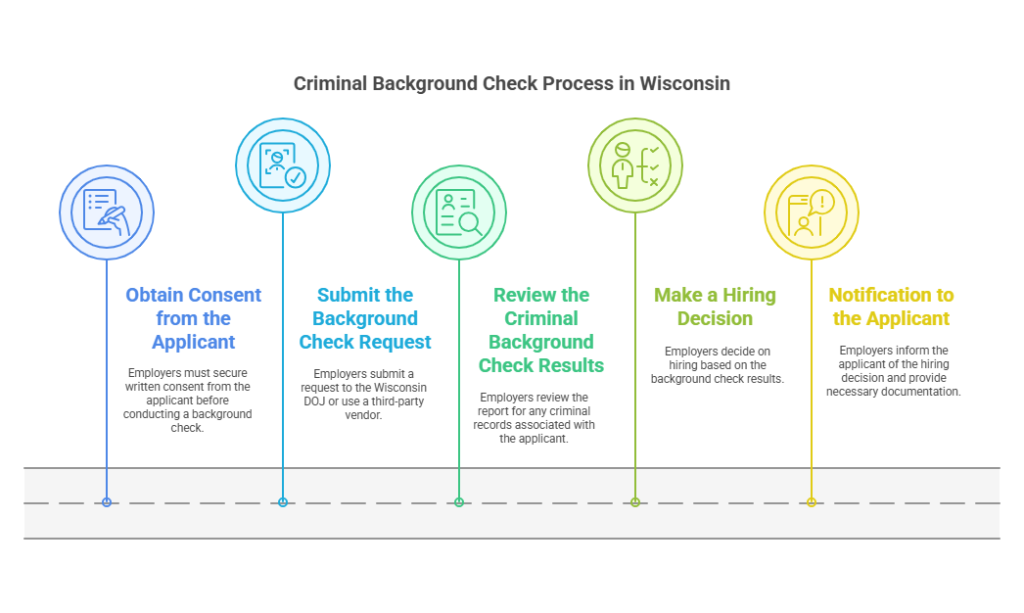
The process of conducting a criminal background check in Wisconsin involves a series of steps that employers need to follow to ensure the screening is accurate, timely, and compliant with state laws. Here is a detailed overview of the process:
- Obtain Consent from the Applicant:
Before conducting a criminal background check, employers in Wisconsin must obtain written consent from the applicant. This is important to comply with both state and federal regulations, including the Fair Credit Reporting Act (FCRA), which mandates that employers must inform applicants that a background check will be conducted and obtain their approval. - Submit the Background Check Request:
Employers can request a criminal background check through the Wisconsin Department of Justice (DOJ). The request can be made online via the Wisconsin Criminal Background Check System (CCS) or submitted manually with the necessary paperwork. In some cases, employers may choose to work with a third-party vendor specializing in criminal background checks.The information required typically includes:- Full name
- Date of birth
- Social Security number
- Other identifying details (sometimes fingerprints may be required, depending on the position)
- Review the Criminal Background Check Results:
Once the background check has been processed, employers will receive a report detailing any criminal records associated with the applicant. This report may include felony or misdemeanor convictions, arrests, or any ongoing investigations. It is important to review the report thoroughly to determine the relevance of the criminal history to the specific position being applied for. - Make a Hiring Decision:
After reviewing the criminal background check results, employers must make an informed decision about whether to hire the applicant. Wisconsin law mandates that employers must consider the nature of the offense, time passed since the conviction, and relevance to the job when making employment decisions. - Notification to the Applicant:
If an applicant is disqualified based on the criminal background check, Wisconsin employers must notify the applicant of their decision. Under FCRA guidelines, employers must provide the applicant with a copy of the background check report and an explanation of the reasons for the disqualification.
What Employers Should Know About Criminal Records in Wisconsin
Employers in Wisconsin must be familiar with the state’s regulations regarding the use of criminal background information in hiring decisions. This ensures compliance with both state and federal laws. Key considerations include:
- The Wisconsin Fair Employment Act (WFEA):
The WFEA prohibits discrimination based on an applicant’s criminal history unless the conviction is substantially related to the job. This means employers cannot automatically disqualify candidates with a criminal history without considering whether the offense is relevant to the role. For example, a conviction for a financial crime may be relevant for a position in a bank, but not for a custodial position. - Ban the Box:
Wisconsin employers must comply with Ban the Box laws, which restrict employers from asking about an applicant’s criminal history on the initial job application. Criminal background checks can only be conducted later in the hiring process, typically after an applicant has been considered for the position. - Time Limits on Criminal Records:
Wisconsin law limits the consideration of certain types of criminal records based on their age. For example, criminal records may be sealed or expunged after a certain period, and the individual may no longer be required to disclose their conviction during the hiring process.
Disqualifying Offenses for Employment in Wisconsin
Certain criminal offenses may disqualify applicants from employment in Wisconsin, especially in fields where safety, security, or public trust are of paramount importance. Some of the offenses that may lead to disqualification include:
| Offense Type | Potential Impact on Employment |
|---|---|
| Felony Convictions | Serious felonies, such as violent crimes, fraud, or drug trafficking, may disqualify applicants from certain positions, particularly in law enforcement, healthcare, and finance. |
| Sex Offender Registration | Individuals listed on the state’s sex offender registry are generally disqualified from positions involving direct contact with minors or vulnerable populations. |
| Domestic Violence Convictions | Domestic violence-related convictions may prevent individuals from being hired for positions requiring physical safety, security, or working with vulnerable individuals. |
| Drug Offenses | Certain drug-related offenses can lead to disqualification for jobs involving handling controlled substances, healthcare, or positions requiring security clearances. |
| Theft, Fraud, or Financial Crimes | These offenses may disqualify candidates from roles in banking, accounting, or other positions handling finances or sensitive information. |
How Rapid Hire Solutions Can Help with Criminal Background Checks in Wisconsin
Rapid Hire Solutions provides employers with comprehensive background check services that are fully compliant with Wisconsin laws. The company helps streamline the criminal background check process, offering the following benefits:
- Accuracy and Compliance: Rapid Hire Solutions ensures that all background checks are conducted according to state and federal regulations, including those outlined by the Wisconsin Department of Justice and FCRA.
- Time Efficiency: The service simplifies the background check process, allowing employers to quickly obtain accurate and reliable results without unnecessary delays.
- Customizable Solutions: Rapid Hire Solutions provides tailored background check packages to meet the specific needs of employers, whether they are screening for entry-level positions or high-security roles.
- Legal Guidance: The company offers expert guidance on how to interpret background check results and make informed, compliant hiring decisions.
Factors Affecting Criminal Background Check Results
The outcome of a criminal background check may vary based on several factors, including:
- Nature of the Offense: Certain offenses, such as violent crimes or fraud, may be more heavily weighted in the hiring process, especially for positions requiring trust and integrity.
- Time Lapsed Since Conviction: Older offenses may be less likely to disqualify an applicant, particularly if they have shown evidence of rehabilitation or if the offense is no longer relevant to the job.
- Industry Regulations: Some industries have stricter requirements when it comes to criminal history, especially those involving public safety, healthcare, or finance.
- State and Federal Laws: Employers must be aware of how state laws, such as those under WFEA and federal regulations like the FCRA, influence the use of criminal background information in hiring decisions.
Legal Aspects, FAQs, and Conclusion
Legal Considerations for Employers Conducting Criminal Background Checks in Wisconsin
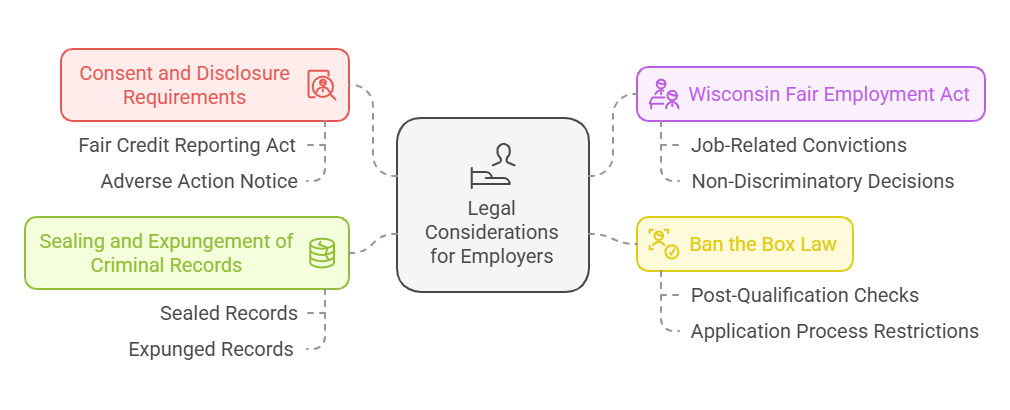
Employers in Wisconsin must be aware of several legal requirements when conducting criminal background checks to ensure compliance with state and federal laws. These laws aim to protect both employers and applicants, ensuring a fair and non-discriminatory hiring process. Key legal considerations include:
- Consent and Disclosure Requirements:
Under the Fair Credit Reporting Act (FCRA), employers must obtain written consent from applicants before conducting a criminal background check. Employers must also provide the applicant with a notice if any adverse action is taken based on the results of the background check. This ensures transparency in the hiring process. - Wisconsin Fair Employment Act (WFEA):
The WFEA prohibits discrimination based on an individual’s criminal history unless the offense is substantially related to the duties of the job. For example, a felony conviction for theft may disqualify an applicant from working in a financial role but may not be relevant for a warehouse position. Employers must ensure that their hiring decisions are based on the nature of the conviction and its relation to the specific job. - Ban the Box Law:
Wisconsin’s Ban the Box law restricts employers from asking about an applicant’s criminal history on job applications. Criminal background checks can only be conducted after the employer has considered the applicant’s qualifications for the role, ensuring that individuals are not unfairly excluded from consideration based solely on their criminal record. This law is designed to reduce discrimination and allow individuals to have a fair opportunity to apply for jobs. - Sealing and Expungement of Criminal Records:
Wisconsin law allows for the sealing or expungement of certain criminal records. If an applicant has successfully had their record sealed or expunged, they are not required to disclose those convictions during the hiring process. Employers must respect these legal protections and refrain from considering sealed or expunged records when making hiring decisions.
How to Interpret Criminal Background Check Results
When reviewing the results of a criminal background check, employers must consider several factors to ensure the decision-making process is fair and compliant:
- Nature of the Offense:
The relevance of a criminal offense depends on the nature of the crime and how it pertains to the duties of the job. For example, an individual with a conviction for driving under the influence (DUI) may not be disqualified from office work but may not be eligible for a position that requires driving company vehicles. - Time Passed Since the Conviction:
Employers should consider how much time has passed since the conviction. The longer the period of rehabilitation or the absence of criminal activity, the less relevant the conviction may be to the applicant’s fitness for the role. For example, a conviction that occurred 15 years ago for a non-violent crime may have less impact on a hiring decision than a recent offense. - Applicant’s Rehabilitation:
Many applicants with criminal records have made significant efforts to rehabilitate themselves, including attending counseling, completing community service, or pursuing educational opportunities. Employers should take rehabilitation into account when interpreting criminal background check results and making a hiring decision. - Job-Specific Considerations:
It is important to determine whether the criminal history is related to the specific responsibilities of the job. For example, a convicted felon may be well-suited for certain jobs but may be disqualified from positions that require access to sensitive financial or personal data.
Frequently Asked Questions about Criminal Background Checks in Wisconsin
What types of crimes show up on a criminal background check for employment in Wisconsin?
A criminal background check for employment in Wisconsin may show felony and misdemeanor convictions, arrests, pending charges, and sex offender registry information. However, certain types of offenses may not show up if the record has been sealed or expunged.
How far back do criminal background checks go in Wisconsin?
Criminal background checks in Wisconsin typically go back as far as the last 10 years for most misdemeanor and felony convictions. However, certain offenses, such as violent crimes or financial fraud, may have a longer-lasting impact on an applicant's record and can be considered beyond 10 years.
Can I be denied employment in Wisconsin due to a criminal conviction?
Yes, it is possible to be denied employment due to a criminal conviction. However, under the Wisconsin Fair Employment Act (WFEA), employers must show that the conviction is substantially related to the job. In addition, employers must consider the nature of the offense, the time passed since the conviction, and any efforts the applicant has made toward rehabilitation.
How do I get a copy of my criminal background check in Wisconsin?
Individuals in Wisconsin can request a copy of their own criminal background check by submitting a request to the Wisconsin Department of Justice (DOJ). A fee may be required, and the individual will need to provide identifying information, such as their full name and date of birth.
Are there any laws protecting individuals with criminal records from being discriminated against in Wisconsin?
Yes, Wisconsin law provides protections for individuals with criminal records under the Wisconsin Fair Employment Act (WFEA). The law prohibits discrimination based on criminal history unless the conviction is substantially related to the job duties. Additionally, Ban the Box laws prevent employers from asking about criminal history on initial job applications.
Conclusion
In conclusion, conducting a Wisconsin criminal background check for employment is an essential step in the hiring process, but it must be done in accordance with state and federal laws to ensure fairness and compliance. Employers must obtain consent from applicants, respect legal protections for individuals with criminal records, and consider the relevance of the offense to the job in question. By understanding the criminal background check process, legal requirements, and best practices for interpretation, employers can make informed and fair hiring decisions.
Employers can also rely on services like Rapid Hire Solutions to streamline the background check process, ensuring they comply with Wisconsin’s legal requirements while making the best hiring decisions. By adhering to these guidelines, employers not only ensure a legal and equitable hiring process but also contribute to building a trustworthy, responsible workforce.
